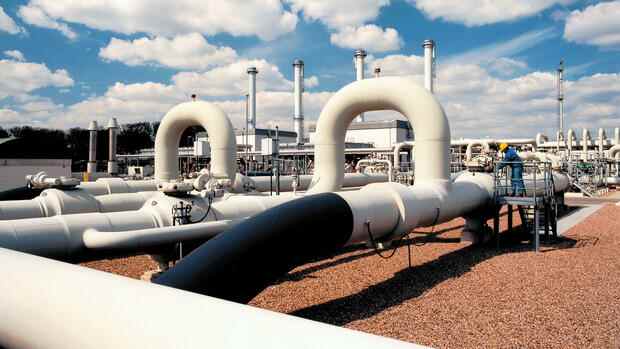The Federal Ministry of Economics wants to ensure that the natural gas storage facilities in Germany have certain minimum filling levels before the start of the heating season.
(Photo: Wingas)
Berlin Federal Minister of Economics Robert Habeck (Greens) wants to ensure that Germany goes into the winter with larger reserves of natural gas. The gas market must be regulated more tightly “to ensure that there is enough gas in the storage tanks at the beginning of the heating period,” Habeck said recently. It is now becoming apparent how this could work.
Officially, the ministry says they are looking at what lessons can be learned from this winter. “Work has begun to further strengthen the precautionary mechanisms”. Discussions were still ongoing.
However, the outlines of the planned regulation are already clearly emerging. At the heart of future storage regulation is a three-stage plan. Trading Hub Europe GmbH (THE) plays an important role in the implementation of the plan.
In stage one, it should ensure that a filling level of ten percent is reached well before the start of the heating period. To this end, the company is to tender long-term gas quantities for storage that must be procured and stored by a certain point in time.
Top jobs of the day
Find the best jobs now and
be notified by email.
THE plays a key role in the German gas market. She has the legally defined function of “market area manager”. The company is responsible for the market area for the whole of Germany and must ensure that natural gas supply and natural gas demand are continuously balanced.
The tasks of the company are laid down in the Energy Industry Act (EnWG). The company does not make any profits, it finances itself from the network charges that gas consumers pay. The shareholders of THE are companies such as Open Grid Europe (OGE), Gasunie Germany and Thyssengas.
From October, the storage should be 80 to 100 percent full
THE is already tendering so-called Long Term Options (LTO) to ensure the stability of the gas supply system. The new task would build on this, but would go far beyond the previous amounts in terms of scope.
The Federal Association of Energy and Water Management (BDEW) sees this positively. The already existing tendering mechanism should “be further developed in an uncomplicated manner in order to contribute to better security of supply,” said BDEW General Manager Kerstin Andreae to the Handelsblatt. Adjusting parameters such as the time, amount and period of the tender could be expanded.
Stage two of the forthcoming regulation stipulates that storage users – i.e. gas importers or gas traders, for example – will be obliged to fill the storage facility to between 80 and 100 percent by the beginning of October. If certain filling levels were not reached on certain dates on the way to this goal, THE Gas would procure by means of a special tender.
>>Read here: Gas Stocks Below Critical Limit – What Happens When Gas Runs Out?
If that does not lead to the desired fill levels either, level three of the new concept would apply as a last resort: THE would buy the required gas directly itself.
From the point of view of the storage operators, the plans have advantages and disadvantages: “Reasonable approaches” can be recognized, but there are also “aspects that still require a fundamental revision,” said Sebastian Bleschke, Managing Director of the Energy Storage Initiative (INES). the operators of the natural gas storage facilities have joined forces.
“The first level of regulation should be expanded from the outset. The market area manager could advertise significantly larger volumes even before the start of the heating season,” says Bleschke. Ten percent would not have been enough last winter.
Don’t overregulate market-based provision
Bleschke is very critical of the planned second stage. It stands in fundamental contradiction to the political objective of better winter precautions. “If politicians ensure minimum filling levels anyway, then the market players will leave it to others to save costs. In all likelihood, storage bookings would decrease,” warns Bleschke.
As a result, responsibility shifts even further from storage users to those responsible for the market area. One should not “ruthlessly regulate” free-market storage behavior.
More: Despite high dependency on Russia, politicians scorn natural gas from Germany
